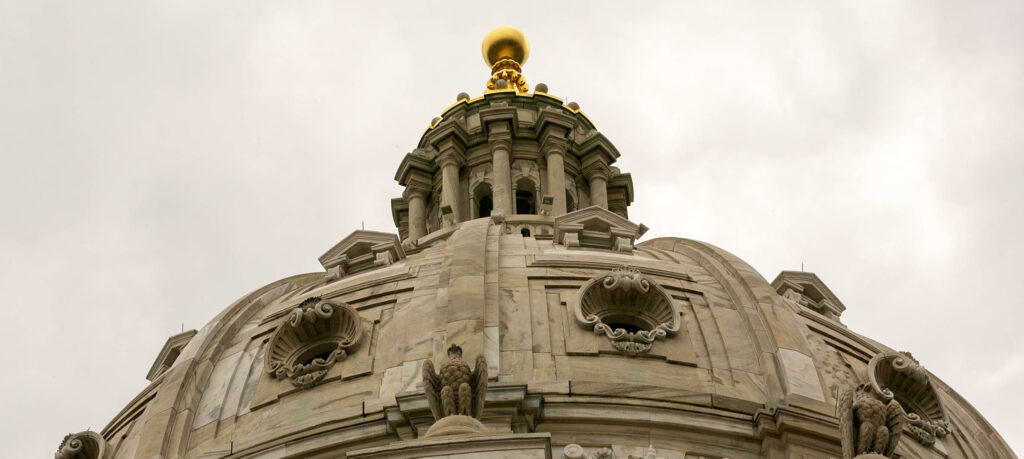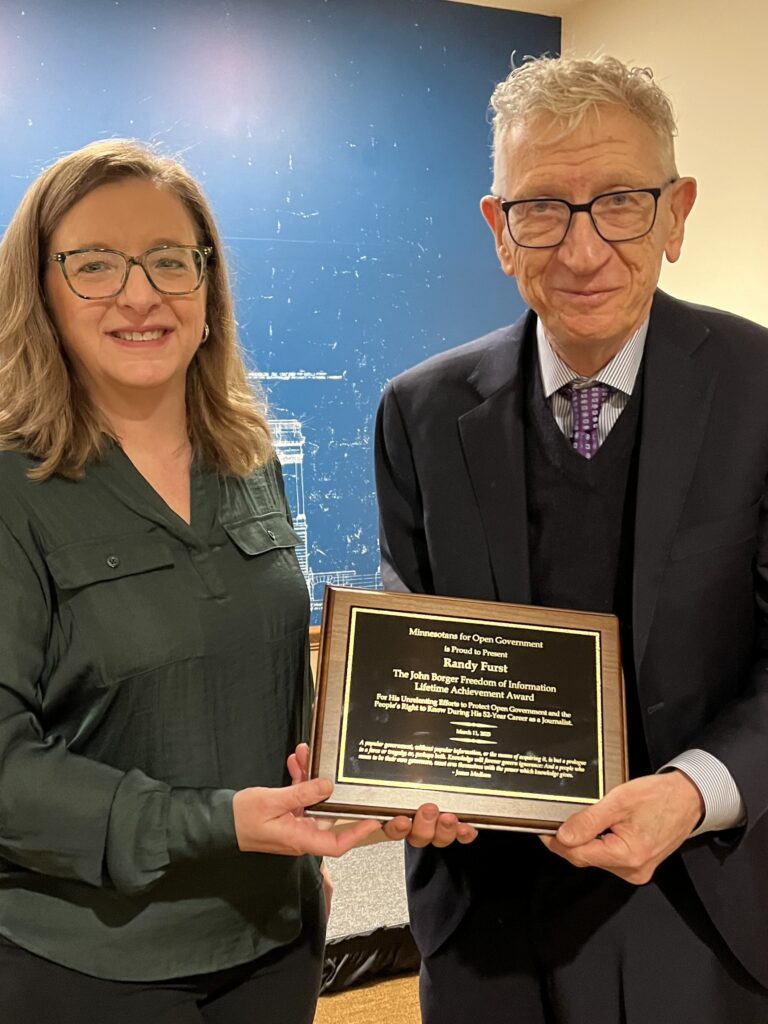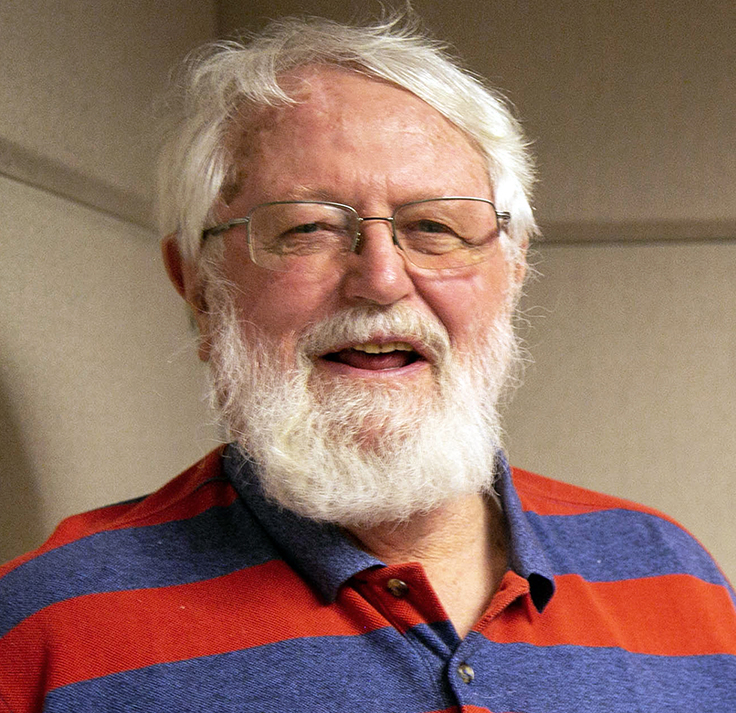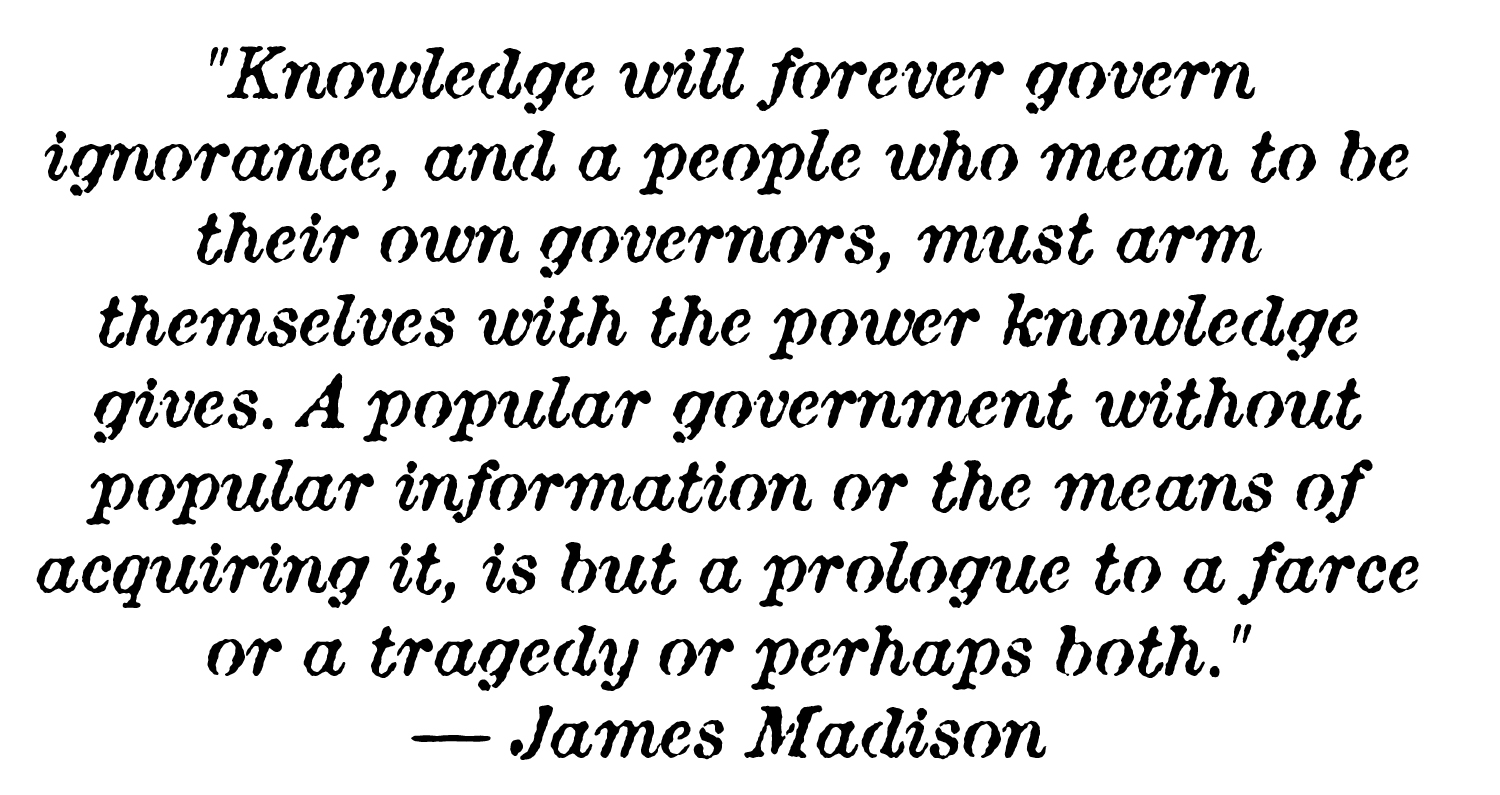“Knowledge will forever govern ignorance….” — James Madison

2025 Legislative Highlights
June 10, 2025: Here’s an overview of MnOG’s work at the Minnesota Legislature this year.
Helped to expand the accessibility of complaint data on public officials
MnOG testified in favor of bills that expanded the amount of “public” data available about government employees designated as “public officials” by Minn. Stat. § 13.43, and helped to move those bills through the committee process. The bills removed statutory language that limited the disclosure of complaint data about public officials (mayors, police chiefs, etc.) in small cities and counties. Also, the definition of “public official” in the context of the Metropolitan Council was expanded to include the Metro Transit police chief and other management-level officials.
Stopped citizen contact information held by the government from becoming “not public”
MnOG stopped a Hennepin County proposal to convert the vast majority of citizen contact information held by government entities into “private” data, thus removing it from public view. Such data is used by reporters to cover government operations; by police oversight activists seeking to contact witnesses to law enforcement activity; and by policy advocates across the political spectrum to connect and organize with others of like mind.
Curtailed problematic, proposed changes to data request procedures
MnGO intervened to improveproposed changes to the Data Practices Act (in House File 1999) to avoid bad outcomes — such as eliminating the ability to file anonymous data requests. MnGO worked with the bill author to instead re-structure HF 1999 to codify existing advisory opinion guidance on how to best handle large data requests (which was the underlying aim of the original bill).
Worked to ensure public access to state OIG data
MnOG worked with the bipartisan authors of SF 856, which would have established a state-level office of inspector general (OIG) position to combat waste, fraud and abuse with state government and its associated contractors. MnOG’s work included drafting language to ensure that the results of OIG investigations were available to the taxpaying public.
Raised awareness of problems with Attorney General transparency
MnOG’s Don Gemberling was the principal expert testifier for House and Senate bills that sought to correct the outcome of an egregious state Supreme Court opinion, Energy Policy Advocates v. Ellison. That opinion re-interpreted Minn. Stat. § 13.65 (the Minnesota Attorney General’s data statute) to close off access to information that had long been publicly available. While the bills failed to advance this past session, MnOG’s work served to raise awareness of the serious transparency problem that flow from the Court’s decision, and the need for future work in this area. The attempt to correct the Supreme Court Decision stalled due to extreme partisanship in the House of Representatives.
Webinar replay: How to access open records in Minnesota
June 10, 2025: MnOG board members Don Gemberling, MaryJo Webster and Brandon Stahl were the guest speakers on a webinar last month hosted by the Minnesota Journalism Center. The webinar, “How to access open records – and how to fight back when you’re denied,” was designed for journalists in Minnesota working at community supported and non-profit news organizations. It would be a useful learning opportunity for anyone wanting to learn more about how to use Minnesota’s public records law. Watch the webinar.
Commentary: Open Meeting Law damaged in rush to legislative finish line
May 20, 2025: In the waning hours of this year’s legislative session, a major change to Minnesota’s Open Meeting Law was passed. The original bill that carried the change had only one Senate hearing, was discussed for six minutes, and had no House companion. There were no House hearings. The conference committee that adopted the change did not discuss the issue in public.
Because of this, Minnesotans are now faced with a major Open Meeting Law change that almost no one in the public realized was coming.
Read the full commentary by board member Matt Ehling in the West Central Tribune. Or see a PDF version here.
Commentary about access to Attorney General’s records
May 5, 2025: The Minnesota Star Tribune published a commentary written by our board member Don Gemberling, stressing the need for legislative action to restore public access to records held by the Minnesota Attorney General’s office.
Gemberling wrote: “No other government entity in Minnesota enjoys near-total control over public access to its data.”
New name: Minnesotans for Open Government
Since our founding in 1989, we’ve been called Minnesota Coalition on Government Information, often referred to as MNCOGI. Our new name, Minnesotans for Open Government, is the product of a months-long review of our mission, vision and values, goals and role in the community.
Watch this space for news of more changes, including a new look and information about how individuals and organizations can join us as champions of government transparency.
Minnesotans for Open Government is the state’s all-volunteer freedom of information council, dedicated to the fight against secrecy. We educate the public, advocate before the legislature and take part in litigation, if need be, to further the cause of government transparency and the public’s right to know.
Need Help?
If you’re a Minnesota citizen or reporter who needs help accessing government records or a governmental body’s public meeting, we can answer your questions and explain potential options. We can also help guide you through the process making an open records request and what to expect once you’ve made it. We offer no legal services.
Contact MNCOGI spokesperson Don Gemberling at mncogi@gmail.com or phone 651-699-6553.
2025 Freedom of Information Awards
March 11, 2025: Minnesotans for Open Government, formerly MNCOGI, announced the winners of the John Finnegan Freedom of Information Award and the John Borger Lifetime Achievement Award.
The John Borger Lifetime Achievement Award: Minnesota Star Tribune reporter Randy Furst, who recently retired after a 52-year career. Furst has been a fierce defender of the First Amendment and government transparency. He has a long track record of using the state’s public records law to shine light on government wrong-doing. That includes two years’ worth of reporting that revealed a now defunct Metro Gang Strike Force was engaging in questionable or illegal activity. He has also been a champion for the First Amendment, leading numerous efforts to protect journalists.

The John Finnegan Freedom of Information Award: Ramsey County District Court Judge Patrick Diamond. Judge Diamond, who died unexpectedly in February, is being honored for a 2024 ruling that the City of Saint Paul had willfully and repeatedly violated the Minnesota Government Data Practices Act (MGDPA) when responding to a citizen’s data request. “Judge Diamond’s insightful and comprehensive assessment of the City’s failure to comply with the letter and spirit of the MGDPA provides enormously valuable legal precedent that substantially contributes to open government in Minnesota.”
Oral argument in MNCOGI v. Minneapolis coaching case
Counsel for MNCOGI recently participated in oral argument related to MNCOGI’s long-running Data Practices lawsuit against the City of Minneapolis. MNCOGI’s lawsuit seeks documents related to the City’s use of “coaching” — including instances where coaching has been used to disciplinary measure to address “B-Level” and above misconduct by police officers.
In 2021, MNCOGI submitted a Data Practices Act request that sought multiple categories of records related to the use of “coaching” by the Minneapolis Police Department. In response to this request, the City categorically denied access to all such records.
MNCOGI then filed suit, contending that the records were wrongfully withheld — including because coaching is, at least sometimes, being used as a form of disciplinary action within the MPD, and documents related to final disciplinary action should be publicly available under the Minnesota Data Practices Act.
Because of ongoing litigation, all inquiries about MNCOGI v. City of Minneapolis should be directed to our counsel, Leita Walker. She can be reached by email at WalkerL@ballardspahr.com.
MNCOGI board chair MaryJo Webster receives Popovich Award
June 2024: MNCOGI board chair MaryJo Webster recently received the Peter S. Popovich Award from the Minnesota Society for Professional Journalists. The award is given annually to “a person or organization that exemplifies the fight for First Amendment Rights.”
Webster is the data editor for the Minnesota Star Tribune. She is also a senior fellow for the Center for Health Journalism’s Data Fellowship program, where she trains and mentors journalists on how to incorporate data into their reporting. She previously taught part-time at the University of Minnesota’s journalism school and is a regular panelist and teacher at national journalism conferences and workshops.
Previously, she worked at the St. Paul Pioneer Press, USA Today, the Center for Public Integrity, Investigative Reporters and Editors, the Oshkosh Northwestern, and the New Ulm Journal.
Read the Star Tribune’s coverage of Webster’s award here.
MNOG in the News. MNOG has been in the news recently. Read these media stories to find out why.
Minnesota Reformer: A bill critics say would aid government secrecy is on the ropes
The Villager Newspaper: District court finds city violated Minnesota’s Data Practices Act
Star Tribune: Judge weighs arguments on whether Minneapolis broke law in secretive police “coaching”
MNCOGI was busy at the Minnesota Capitol and the courts in 2024, working both to pass needed new laws and to curb efforts that could impinge on existing public data access rights.
Red Light cameras. MNCOGI has been providing input to a working group focused on red light camera/speed camera policy. During the 2024 legislative session, MNCOGI took part in negotiations over the red light/speed camera pilot project that passed at the end of session. Since then, MNCOGI has provided input on transparency issues to the red light/speed camera working group convened by the Minnesota Department of Public Safety.
Attorney General data. MNCOGI spokesperson Don Gemberling testified before the Legislative Commission on Data Practices regarding problems with the Minnesota Supreme Court’s new interpretation of the Attorney General’s data classification statute. Read more…
Minnesota Open Meeting Law. MNCOGI worked on initiatives to improve Minnesota’s Open Meeting Law (OML), and also worked to stem problematic OML legislation. Read more…
Hennepin County data bill. MNCOGI worked to stop a problematic Hennepin County data bill from advancing through the legislative process. Read more…
Preserving access to DLI data. When the Minnesota Department of Labor, along with the Attorney General and several other state entities brought forward a bill to create a new “Intergovernmental Misclassification” Partnership entity, the bill language could be read to exempt the new entity from the Data Practices Act. Read more…
Don Gemberling: Hall of Famer
Don Gemberling, MNCOGI’s longest serving board member, has been unanimously inducted into the National Freedom of Information Coalition’s State Open Government Hall of Fame, class of 2023.


